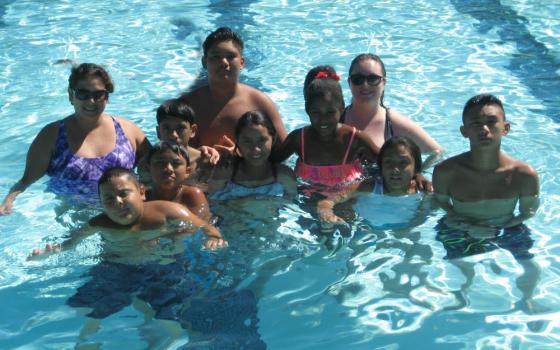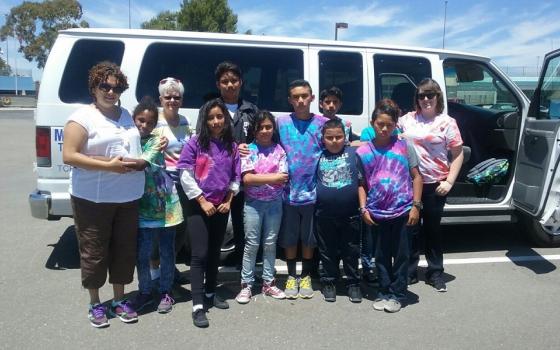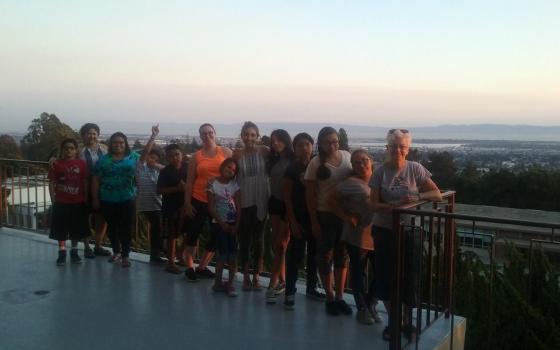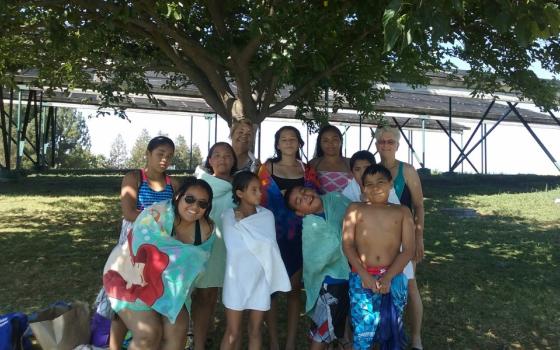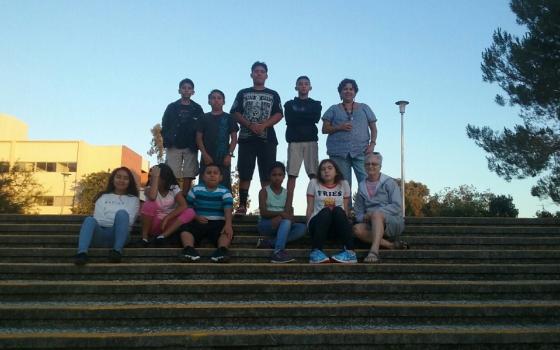I am not a person who likes to sit around doing nothing when I have some free time. Since I am a teacher, during the summer I like to try to find something that will take me to the edge, out of my comfort zone and call me to more.
This summer I volunteered at Camp Suzanne which is an outgrowth of Get On The Bus out of the Center for Restorative Justice in North Hollywood, California. Sixteen years ago, two Sisters of St. Joseph, both named Suzanne, responded to the needs of mothers in prison, who said they wanted to see their children. That year one bus with 15 children went to the women's prison in Chowchilla on the Saturday before Mother's Day. Since then the program has expanded to other prisons and many more buses. Camp Suzanne was born out of this need and the success of these visits.
When I first saw the name Camp Suzanne I suspected that it had something to do with our two sisters, Suzanne Jabro and Suzanne Steffen, who had been involved in prison ministry. I had ridden the bus many times taking children for a day to visit their mothers and I had also taken other visitors on the Family Express, a service also provided by the Center for Restorative Justice. This was enough reason for me to volunteer for two sessions of camp.
What would I do? What responsibilities would I have? Blindly, but with courage and a desire to make a difference, I met the van at California State University in Hayward where the camp was being held. It had come from Los Angeles, bringing the camp coordinator, a camp counselor and five boys and four girls ranging in age from 8 to 15. Every day we went to The Federal Correction Institution in Dublin, about an hour away. The children visited their mothers for five hours, participating in activities planned by art therapists. When their visits were over we took the children swimming, or to a park, or we had other activities like tie-dying. Physical activity was needed after days that were quite emotional.
The very first day that the children saw their mothers was quite moving. When I saw Nathaniel, our youngest camper, run to his mother who embraced him, I was surprised I had to fight back tears. Every morning the greetings were warm and tender, as were the moments before leaving.
Thursday night we had the children write a message to their mothers on the back of a photo that had been taken of them with their mother. They also wrote a letter which would be given to their mother after the children left camp. We weren't prepared for the emotion that flooded that space. One by one the boys especially were overcome by sadness and needed to go to their rooms to cry and to regain their composure. I took Nathaniel for a walk to calm him down and he thanked me over and over again.
Even though the next day was emotional when the children gave their mothers a rose with their photo and message, they were able to deal with it more easily because of Thursday night.
I knew then that even though the night before had been really difficult, it was a gift that helped the children cope with leaving. The departure went smoothly. The children knew that they were loved and the mothers had memories that would hopefully sustain them.
The second week of camp was held at Holy Names University in Oakland. Once again I met the van bringing the camp coordinator, two camp counselors and five girls and three boys ranging in age from 9 to 14.
My favorite time during this second week was on a warm evening when we were eating outside. The stars and the fading sun supplied all the light we needed. We had a drumming circle during which we invited each camper to participate and contribute to the rhythm that united us in sound. With that experience still reverberating in our bodies we did t'ai chi and then the campers were sent off to bed. I was able to share my gifts as I led each of these activities, adding to their significance for me.
Was I called out of my comfort zone? Did I go to the edge? Yes, and I loved every moment of camp! Although I teach children, this was different. Here, I lived with these children for a week, anticipating their needs and supporting them however I could. I allowed myself to feel the emotions, never knowing what each day, each visit, would bring but being willing to share it with the children and the mothers.
How could I be the same after this? I felt my heart open to the pain of both the mothers and the children. It amazed me that in prison I found a great freedom to embrace myself and my gifts, to be a presence for others with no job description.
Now each day I pray for our campers, their mothers and caregivers as I go about my ordinary life with greater compassion and a desire to make life a bit easier for others. Feeling the difference in myself, I respond more freely to opportunities to use my gifts and be open to those in need of compassion.
[Mary Schneider is a Sister of St. Joseph of Carondelet, an artist, dancer, teacher and part of the support staff for senior sisters in Los Angeles. She celebrated her 50th Jubilee in 2011.]
Another story you might like - Restorative justice helps perpetrators and victims alike
